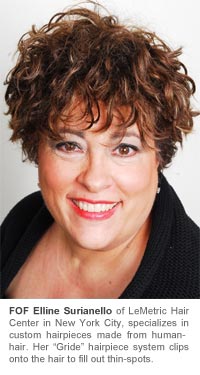Two Cleveland Clinic dermatologists–Dr. Wilma Bergfeld and Dr. Melissa Piliang– weigh in on what to do when your locks are lacking. (Hint: There’s a lot you can do.)

- FOF: How common is hair loss for women over 50?
- Dr. B: Extremely common. 100 percent of women go through hair loss to some degree during menopause.
- FOF: What happens during menopause that triggers hair loss?
- Dr. P: Estrogen levels start to drop. All hormone levels drop over time, but sometimes estrogen drops a little faster and you get an imbalance with too much of the male hormones like progesterone and testosterone. Most hair loss in women over fifty has to do with these hormone changes.
- FOF: Are there other causes?
- Dr. B: Genetics play a factor as well as nutrition. Endocrine and metabolic diseases such as diabetes and thyroid disease can also be factors.
- FOF: Are these diseases more prevalent in women over 50?
- Dr. P: Diabetes tends to increase with age and weight. Many people gain weight over time and at menopause. Thyroid disease is fairly common at all ages but the incidence is cumulative. So as people age, more people are developing thyroid disease. Any time someone has hair loss we check the thyroid.
- FOF: What can you do to prevent hair loss?
- Dr. B: No one knows for sure. A healthy lifestyle can really help. Hair cells turn over quickly, which means that external and internal factors such as diet and exercise have a large effect. Some women think a healthy diet means eliminating carbs and red meat but in fact those foods can provide nutrients that are helpful for hair loss.
- I believe in vitamin supplements. When you are low on zinc, iron, antioxidants and Vitamin D your hair doesn’t do as well. Most people are Vitamin D deficient so we need to supplement it with vitamins.
- FOF: What about shampoos?
- Dr. B: Choose shampoos that contain zinc. They inhibit testosterone, which clogs the hair follicles, preventing growth.
- FOF: Are there psychological effects of hair loss?
- Dr. B: Studies on acne and psoriasis have found that if your body is altered and unlike other people’s you are more likely to be depressed and anxious. Also, those people are hired less and are less likely to have good interpersonal relationships.
- FOF: Once you’ve already lost a significant amount of hair, is there anything you can do to grow it back?
- Dr. P: It’s important to correct any problems you have that are causing the hair loss. So if you have a lot of stress, it’s important to get your stress under control through exercise, yoga–those kinds of things.
- FOF: What about hormone replacement pills or birth control?
- Dr. P: Hormone replacement and birth control pills provide estrogen to rebalance the hormone levels. For many women they have helped significantly. That became abundantly clear to me in the early 2000s when everyone went off of hormone replacement because of data linking it with breast cancer and heart disease. We suddenly saw a lot of women with shedding. Spironolactone, an off-label drug, has anti-androgen effects and can block that male-type hormone effect in the hair follicle, so it can counteract some of the age-related, hormone-induced hair loss.
- FOF: Explain “off label.”
- Dr. B: These drugs are not specifically approved for hair loss, but they are safe and effective in treating it. FDA approval takes a lot of money – millions. If the drug is already on the market for one thing, the drug company doesn’t go back and ask for approval for another use.
- FOF: There are many non-prescription hair loss treatments advertised, from lasers and creams to supplements. What works and what’s hype?
- Dr. P: That’s very difficult to determine. The only thing FDA-approved for hair re-growth in women is Minoxidil, so many patients we see with hair loss of all types we start with Minoxidil because that’s always a safe and reasonable thing to try.
- FOF: Menoxidil? Is that Rogaine?
- Dr. P: Generic Rogaine, yes. There’s a formulation for women and a formulation for men.
- FOF: We spoke with Tiffany Masielle-Helt of Precision Laser Therapy who said that they have a 90 percent success rate re-growing hair on women they treat with laser therapy. Could this be true?
- Dr. P: I have not seen results like that in my experience. I don’t know what lasers they were using or what therapy exactly they were using. I would be skeptical of anything that claims a 90 percent success rate. Without seeing that data, I can’t comment for sure.
- FOF: What about hair transplants–do they work?
- Dr. B: They’re excellent if done by the right surgeon. I have many patients who have had them and love them. The trick is to pick a surgeon who is known for doing females. It’s a little more difficult to do hair transplants on women than men.
- FOF: How do you find a reputable hair replacement surgeon?
- Dr. P: Ask your dermatologist for recommendations. You want someone who primarily does hair transplantations–a large volume. Sit and get consultations. Spend some time with at least three hair transplant surgeons and look at their results.
 FOF: If someone doesn’t qualify for hair transplants or laser therapy, what do you think of wigs or hairpieces?
FOF: If someone doesn’t qualify for hair transplants or laser therapy, what do you think of wigs or hairpieces?
- Dr. P: Certainly those are options. They can be emotionally life altering for patients. If a woman’s hair is very thin and she feels self conscious going out, a hairpiece can make her feel much better. And they’re not going to damage your hair or make your hair loss worse.
- FOF: Even those that use adhesive or glue?
- Dr. P: If you go to someone who is very good, they’re not going to damage what hair you have left. Sometimes if patients have medical problems, they can get a prescription for “hair prosthesis” (technical term for a wig) and insurance will cover it or it can be written off your taxes as a medical expense.
- FOF: What kind of doctor should you consult if you notice hair loss? A Dermatologist? An Endocrinologist?
- Dr. B: Not to many doctors pay attention to hair loss. I’d say a dermatologist who is interested in hair loss. There are only a few people across the country like this. If I were a patient, I would call a dermatologist and say ‘Do you take care of hair loss?’”
- FOF: What’s the most important thing FOFs can take away from this conversation?
- Dr. B: When it comes to hair loss, most doctors will say ‘you are getting older so you should expect it.’ Do not accept that statement. Hair follicles are one of the bodies’ fastest cells to turn over so there might be something you can do about it.
| Author | |
 |
Melissa Piliang, M.D. Cleveland Clinic, Anatomic Pathology Melissa Piliang, M.D., is a Dermatologist who practices at the Cleveland Clinic Center. Dr. Piliang has joint appointments in the Departments of Dermatology and Anatomic Pathology. She is board-certified in both dermatology and dermatopathology. Her many interests include acne, androgen disorders, hair disorders, nail disorders, dermatitis and tumors of the skin. Wilma Bergfeld, M.D. Cleveland Clinic Center, Anatomic Pathology Wilma Bergfeld, M.D. is a Senior Dermatologist and Professor of Dermatology at the Cleveland Clinic. She is also the Director of the Cleveland Clinic’s Dermatopathology Fellowship. Dr Bergfeld’s specialty interests include clinical dermatology, dermatopathology, hair disorders, androgen excess, photoaging and cosmetic dermatology. |


0 Responses to “Which is Thinner, Your Hips Or Your Hair?”
ROCHSONS says:
Good information. I too suffer from hair loss right down the middle of my head with a fifty cent piece missing at the crown. I am constantly making sure I comb my hair to the side but some people still make comments. LOL
pvarrios says:
I also suffer from hair loss and the information you have provided here gets me heading in directions I did not know about before. I have Graves disease (thyroid condition) and been through menopause and my hair has thinned to the point of real concern. True to what you said here, when I brought up my hair loss concerns to my doctor he more or less blew me off. He did mention menoxidil but also added that as soon as I quit using it I would be right back to where I was before using the product.
DonnaRead50 says:
Thank you for this simple and informative Q&A! It was nice to read something that is not touting a product or service. I suffer from genetic and stress related hair loss and didn’t know some of this!